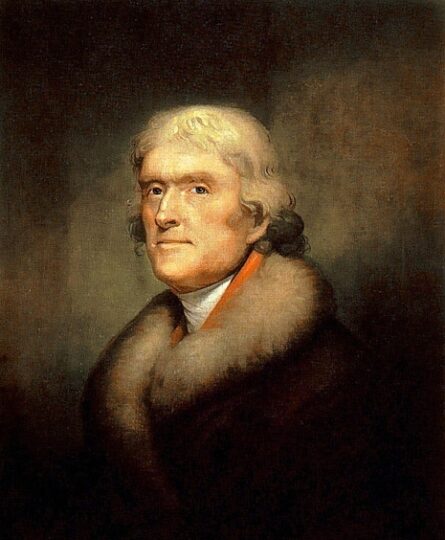No, I’m not trying to reignite the old argument about the morality of using the bomb to end World War II. Rather, I’m trying to get deeper into an age-old debate in American foreign policy, Jeffersonian idealism vs the imperialism and realpolitik of Bismarck, Churchill, and Teddy Roosevelt. Jefferson believed that America was a new light of democracy in a world choked by autocrats and kings. He believed in diplomacy, in treating other nations fairly, in countries dealing with each other very much as people deal with other people. He wanted a weak central government, with a small navy and no standing army, and he was the man who instituted the Bill of Rights as part of the Constitution to ensure government did not trample the common man.

The Atlantic Ocean was a lot bigger in Jefferson’s day, a much stronger barrier to protect us from foreign intervention, and while Native Americans contested lands with the white settlers, they were never a threat to the existence of the new American nation. Spain was decaying and in process of losing its New World colonies, France was in the throes of revolution, and Britain was too concerned with its remaining empire to have much concern over this upstart breakaway nation. So, there really were no enemies to threaten us. It’s easy to be an idealist in such comfortable circumstances.
More, there was no Nazi Germany. There were no Stalinist purges or rape of Nanking or killing fields in Cambodia to shake Jefferson’s faith in the basic morality of man. Yes, there had been horrendous religious wars that had killed millions in Europe and the Middle East, but these could not compare to the industrial-level slaughters of the 20th Century. Could Jefferson’s diplomacy have been reasonable and even-handed after Pearl Harbor? Could Jefferson’s idealism have survived the Holocaust?
Perhaps the closest modern-day president to Jefferson was Jimmy Carter, the peanut farmer from Georgia who in the early days of his campaign went door-to-door to canvas for voters. Carter pushed through the Camp David Accords that provided peace between Egypt and Israel. He refused to turn a blind eye to the secret murder squads that were causing intellectuals to be eliminated in right-wind countries that were nominal allies of the US in the Cold War. He negotiated a treaty to give the Panama Canal back to the Panamanians. And he began a unilateral reduction in missiles to encourage the Soviet Union to do the same. These are actions of which Jefferson would have undoubtedly approved.
Carter was often dismissed and even mocked in his day for ignoring the harsh realities of foreign relations and the Cold War. Yet he had an impact that long outlasted his administration. The peace treaty between Egypt and Israel, while flawed for not addressing the Palestinian question, nevertheless has formed a cornerstone for a gradual normalization of relations in the Middle East. While the death squads continued in Argentina and Chile, they were driven underground and claimed fewer victims than they had previously. And when the Soviet Union attempted to exploit Carter’s peace initiative, he countered with deployment of intermediate range missiles they could not match; while Reagan took the credit, the seeds for the fall of the Soviet Union were planted by Jimmy Carter in the later half of the 1970s.
Carter is remembered most for the 444 days of the Iran hostage crisis and for spiraling inflation, for both of which he rightly had some blame and which he worked diligently to address. Would Jefferson have done a better job of dealing with the Ayatollah Khomeini and the Iranian Revolution? Possibly. Jefferson would have been very shy of using the CIA to destabilize or support foreign governments, and his reputation for honesty might have given him higher status among the students who stormed the American embassy and initiated the crisis. But then again, Jefferson never had to contend with an America desperate for Middle East oil or face the internal Islamic struggle of Sunni verses Shiite.
All conjecture, of course, though it is more than the usual historical game-playing of “what ifs”, for it drives to the question of whether Jeffersonian idealism was a viable diplomatic policy then, now, or in the future. It is important to stress that idealism does not mean blindness, stupidity, or weakness. Jefferson responded to the piracy of the Barbary States by sending the first American fleet to North Africa to project American power, and his staunch position on westward expansion help encourage Napoleon to sell the entire area of Louisiana for a paltry $15 million. Idealism helps to project “soft power”, the goodwill of allies and neutrals alike to trust us and, in many cases, to side with us as we stand for honesty and freedom for all peoples. That is Jefferson at his very best.
What would make for historical conjecture, of course, is trying to put Jimmy Carter back in the 18th Century and have him become the 3rd President of the United States. Would he have fared as well as Jefferson in that simpler time, or would he have found himself confounded by the likes of John Adams, Alexander Hamilton, and the Federalists? And how would the Georgia-born, Evangelical Jimmy Carter have dealt with the question of slavery? Jefferson said slavery was like holding a wolf by its ears: you didn’t like the look of it, but you dare not let it go. Would Carter have eased his grip on those wolf ears?
Leave a Reply